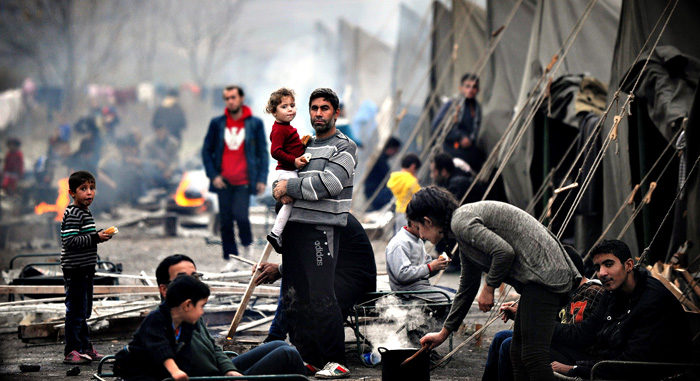MOHA ENNAJI
Since 2012, more than 12 million migrants and refugees have landed in Europe, the Middle East, and North Africa. The result has been an escalating political and humanitarian crisis – and increasingly heated debate about how to address it.
In Europe, the debate is characterized by dissent and division, exemplified by the United Kingdom’s recent vote to leave the European Union – an outcome that was shaped largely by overblown fears about immigration. With EU member states failing to agree on how to secure external borders, much less what to do with the refugees who have already arrived, an effective, unified response has proved elusive.
In the Middle East, the refugee debate is not nearly as loud, but it is no less passionate. Jordan, a country of 6.5 million, now hosts more than 1.4 million, mostly Syrian, refugees. Lebanon’s 1.5 million Syrian refugees represent nearly one-third of the country’s population of 4.7 million. Turkey, with some 75 million citizens, now hosts 2.7 million Syrian refugees, about 30% of whom live in 22 government-run camps near the Syrian border.
With most of the refugees originating in the Middle East – especially Syria, but also Afghanistan, Iraq, Yemen, and Libya – the fact that the region is shouldering the overwhelming share of the burden is not surprising. But not all Middle Eastern countries have done enough.
The Gulf countries, despite their vast oil wealth, have taken in hardly any refugees; they contend that, because they are not parties to the 1951 United Nations Refugee Convention, they have no obligation to do so. The United Arab Emirates, for example, has taken in just over 200,000 Syrian nationals since the Syrian crisis began in 2011. Egypt, Tunisia, Morocco, and Algeria permit Syrian refugees to enter, but provide no support to those who do; there are no refugees camps in these countries.
Meanwhile, their neighbors are straining under the weight of the crisis. Already, Jordan’s social-welfare budget is reaching a breaking point, spurring social tensions. Schools in both Jordan and Lebanon were overcrowded even before the refugees arrived; now they are bursting at the seams. Even the refugees who work in Jordan and Lebanon are creating problems, as they inadvertently suppress wages for lower-skill jobs. Turkey’s government has delivered more than $8 billion in aid; by contrast, the EU has delivered only a small share of the €3.2 billion ($3.6 billion) it pledged last November.
With host countries overstretched, it is unsurprising that refugees live in rough conditions, whether in camps or very poor neighborhoods, with no amenities or sanitation. Hundreds of thousands of refugees are unemployed, including the most highly skilled among them, whose qualifications are often not recognized. As a result, forced labor, slavery, prostitution, and social exclusion are on the rise.
Keeping the migrants largely in the Middle East is critical – not least to prevent them from drowning in the Mediterranean in their attempt to reach Europe. The Turkey-EU agreement concluded last March – according to which non-refugee migrants who reach the EU are sent to Turkey – has helped, contributing to a sharp decline in the number of migrants arriving in Greece.
But much more needs to be done – and Middle Eastern countries should take the lead. Most urgently, the wealthy Gulf states should provide more funding to the countries that are hosting the most refugees, thereby enabling them to begin improving living conditions for those seeking safety. Then, in order to develop a more comprehensive solution that keeps countries stable and ensures that refugees receive adequate protection, deeper collaboration among governments, as well as with the private sector and civil-society organizations across the region, is needed.
The problem is that there is no consensus in the Middle East, either among governments or civil society, about how to respond to the crisis. To break the impasse, one or two bold and far-sighted leaders need to remind their citizens of their countries’ legal and, perhaps more important, moral duties to the refugees. The Islamic tradition of protecting the welfare of the poor can provide the language and legitimacy needed to inspire citizens to do their part.
In my book New Horizons of Muslim Diaspora in North America and Europe, I argue against the conventional wisdom that migrants and refugees are a threat to the Middle East’s security and development. Just like in the developed countries of the West, migrants in the Middle East can offer untold contributions to their host societies. We just need to let them.
Above all, the refugees’ basic needs must be met. Decent living conditions – including housing, nutrition, and health care – must be guaranteed, in addition to educational and employment opportunities.
If a few countries continue to shoulder the entire burden, however, it will be virtually impossible to meet the refugees’ needs. Given this, the region needs to develop a mechanism for distributing refugees more fairly across countries, something like the EU’s quota system. Standardized and streamlined procedures for handling asylum applications must also be implemented.
Even if all of this is achieved, a truly sustainable solution to the refugee crisis will not come until Syria is at peace, and order is restored in failing states across the Middle East. That is why it is so important for the region’s governments to play a bigger and more assertive role in tackling the violence and instability that lies at the root of the crisis.
We cannot afford to wait for outside powers to resolve our most pressing problems. Our governments must invest heavily in our neighbors’ stability, including by bringing the Syrian peace process to a successful conclusion, and in the wellbeing of all of our citizens.







Comments